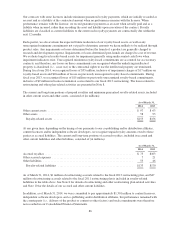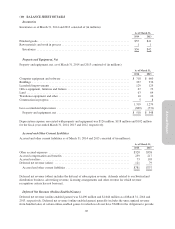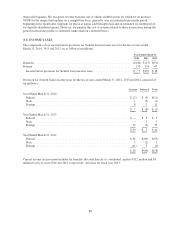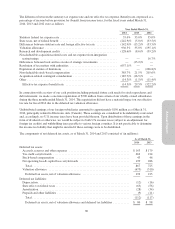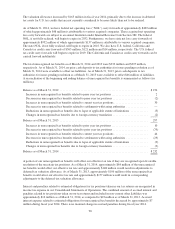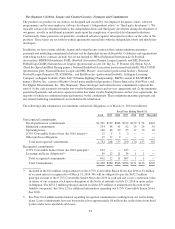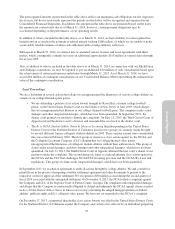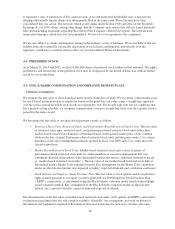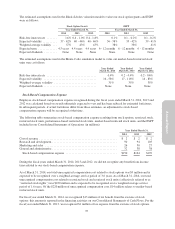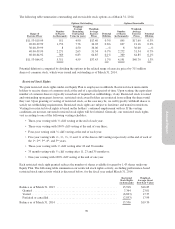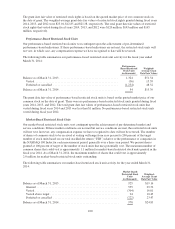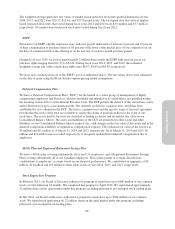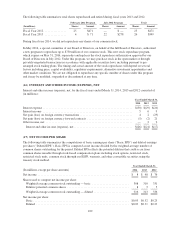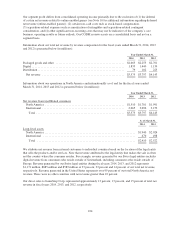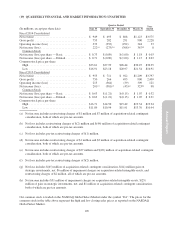Electronic Arts 2014 Annual Report Download - page 166
Download and view the complete annual report
Please find page 166 of the 2014 Electronic Arts annual report below. You can navigate through the pages in the report by either clicking on the pages listed below, or by using the keyword search tool below to find specific information within the annual report.to represent a class of purchasers of EA common stock. A second purported shareholder class action lawsuit
alleging substantially similar claims was subsequently filed in the same court. These lawsuits have been
consolidated into one action. The lawsuits, which assert claims under Section 10(b) and 20(a) of the Securities
Exchange Act of 1934, allege, among other things, that the Company and certain of its officers issued materially
false and misleading statements regarding the rollout of the Company’s Battlefield 4 game. The lawsuits seek
unspecified damages, which have not been quantified. We have not yet responded to the complaints.
We are also subject to claims and litigation arising in the ordinary course of business. We do not believe that any
liability from any reasonably foreseeable disposition of such claims and litigation, individually or in the
aggregate, would have a material adverse effect on our Consolidated Financial Statements.
(14) PREFERRED STOCK
As of March 31, 2014 and 2013, we had 10,000,000 shares of preferred stock authorized but unissued. The rights,
preferences, and restrictions of the preferred stock may be designated by our Board of Directors without further
action by our stockholders.
(15) STOCK-BASED COMPENSATION AND EMPLOYEE BENEFIT PLANS
Valuation Assumptions
We estimate the fair value of share-based payment awards on the date of grant. We recognize compensation costs
for stock-based payment awards to employees based on the grant-date fair value using a straight-line approach
over the service period for which such awards are expected to vest. For awards with only service conditions that
has a graded vesting schedule, we recognize compensation costs on a straight-line basis over the requisite service
period for the entire award.
We determine the fair value of our share-based payment awards as follows:
•Restricted Stock Units, Restricted Stock, and Performance-Based Restricted Stock Units. The fair value
of restricted stock units, restricted stock, and performance-based restricted stock units (other than
market-based restricted stock units) is determined based on the quoted market price of our common
stock on the date of grant. Performance-based restricted stock units include grants made (1) to certain
members of executive management primarily granted in fiscal year 2009 and (2) in connection with
certain acquisitions.
•Market-Based Restricted Stock Units. Market-based restricted stock units consist of grants of
performance-based restricted stock units to certain members of executive management that vest
contingent upon the achievement of pre-determined market and service conditions (referred to herein
as “market-based restricted stock units”). The fair value of our market-based restricted stock units is
determined using a Monte-Carlo simulation model. Key assumptions for the Monte-Carlo simulation
model are the risk-free interest rate, expected volatility, expected dividends and correlation coefficient.
•Stock Options and Employee Stock Purchase Plan. The fair value of stock options and stock purchase
rights granted pursuant to our equity incentive plans and our 2000 Employee Stock Purchase Plan
(“ESPP”), respectively, is determined using the Black-Scholes valuation model based on the multiple-
award valuation method. Key assumptions of the Black-Scholes valuation model are the risk-free
interest rate, expected volatility, expected term and expected dividends.
The determination of the fair value of market-based restricted stock units, stock options and ESPP is affected by
assumptions regarding subjective and complex variables. Generally, our assumptions are based on historical
information and judgment is required to determine if historical trends may be indicators of future outcomes.
96


